2021中考英语专项训练:简单句
图片预览
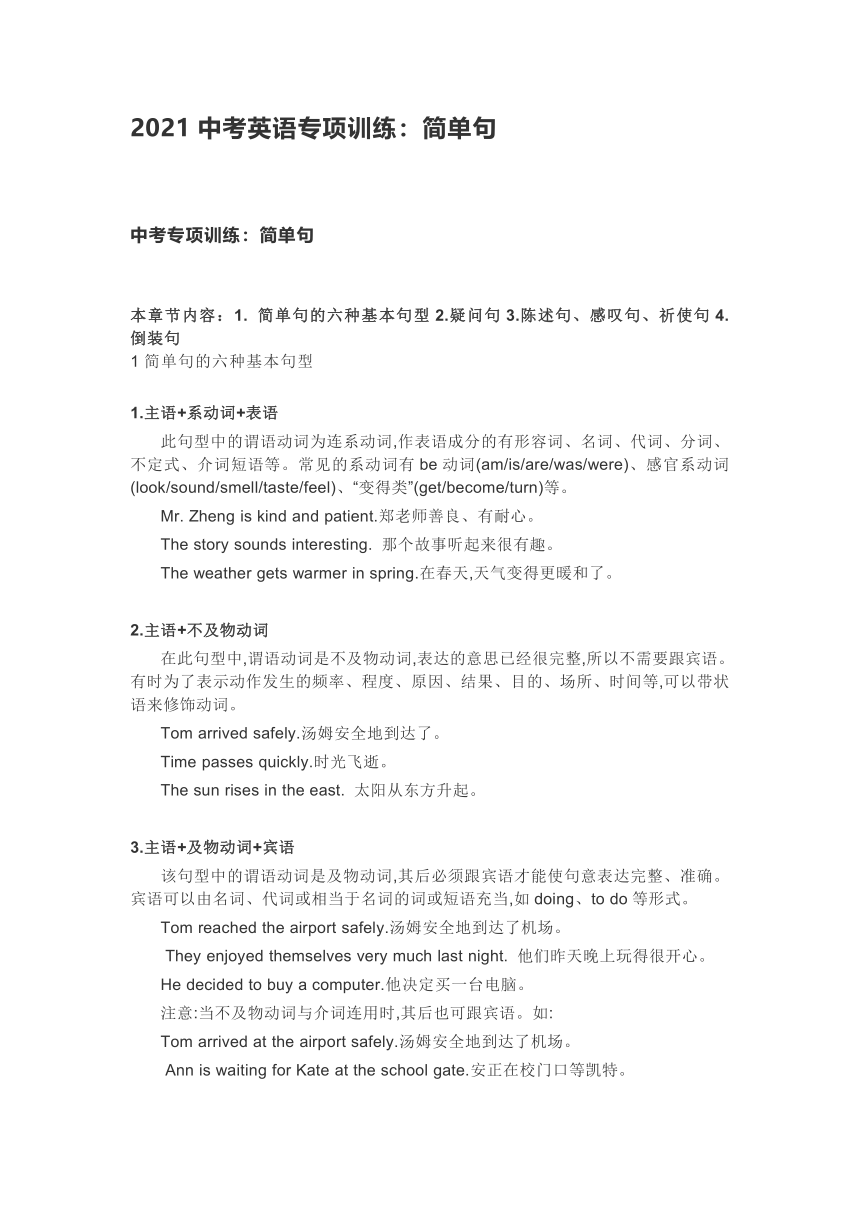
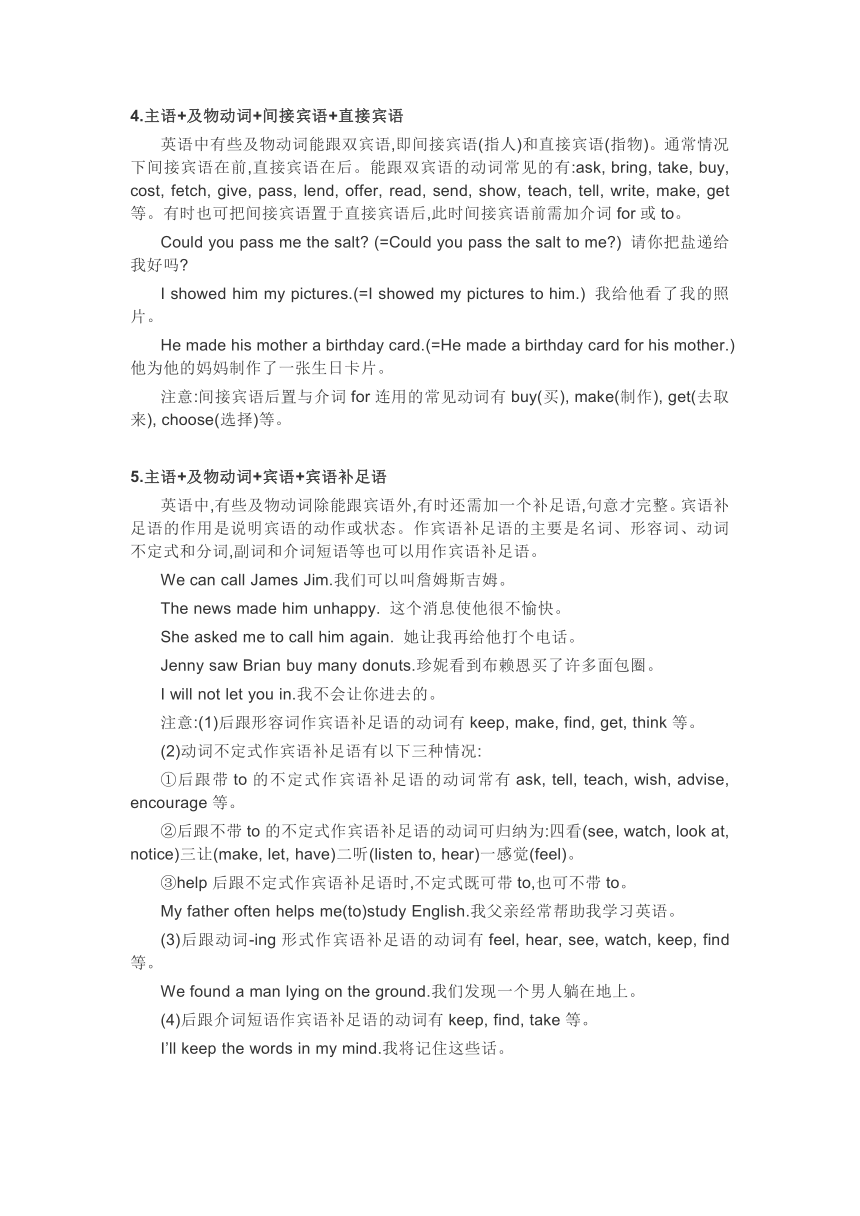
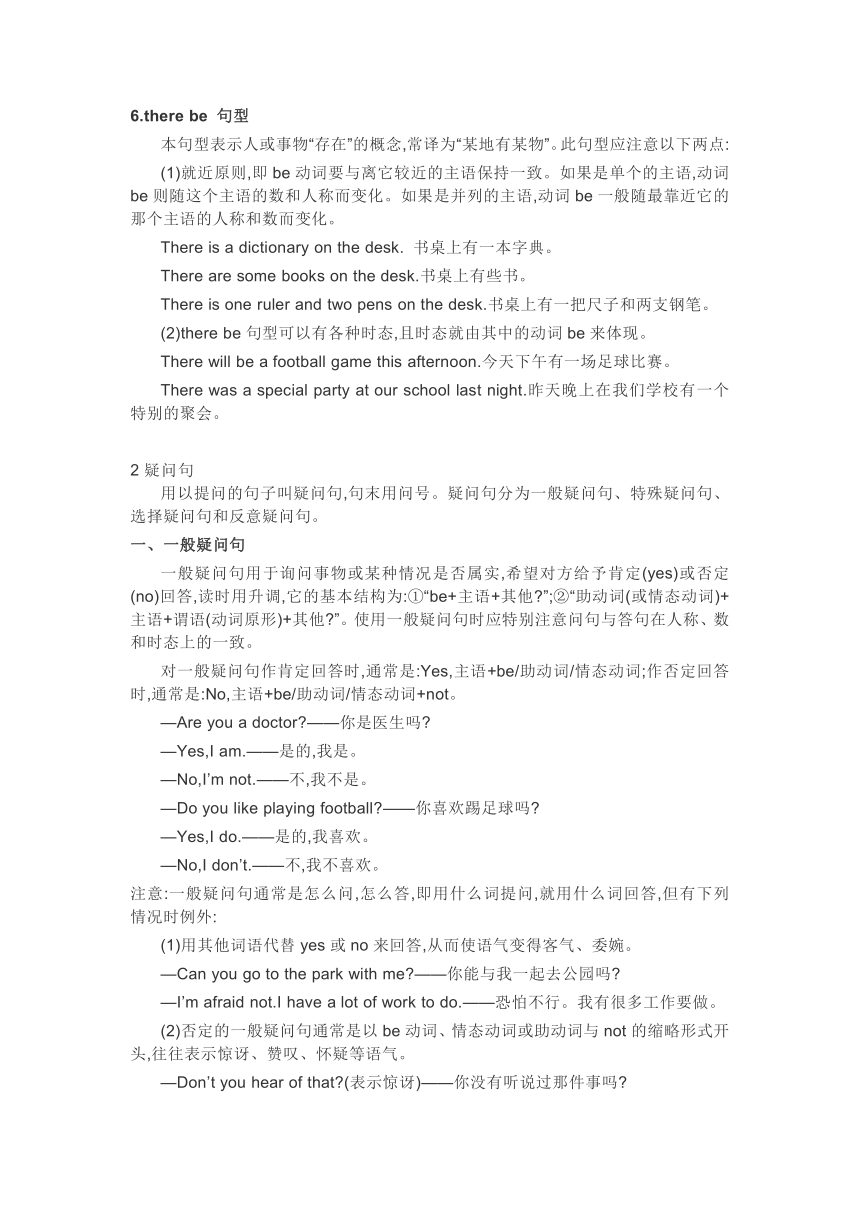
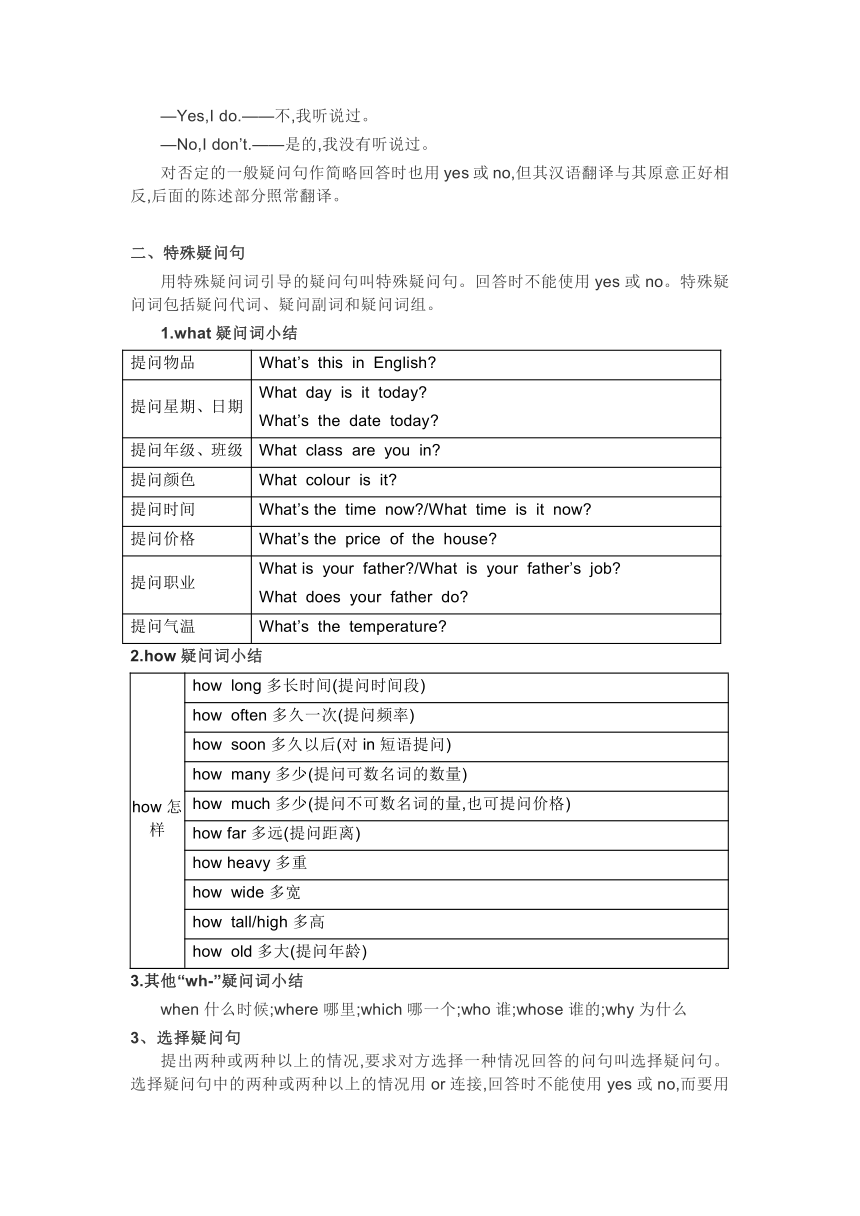
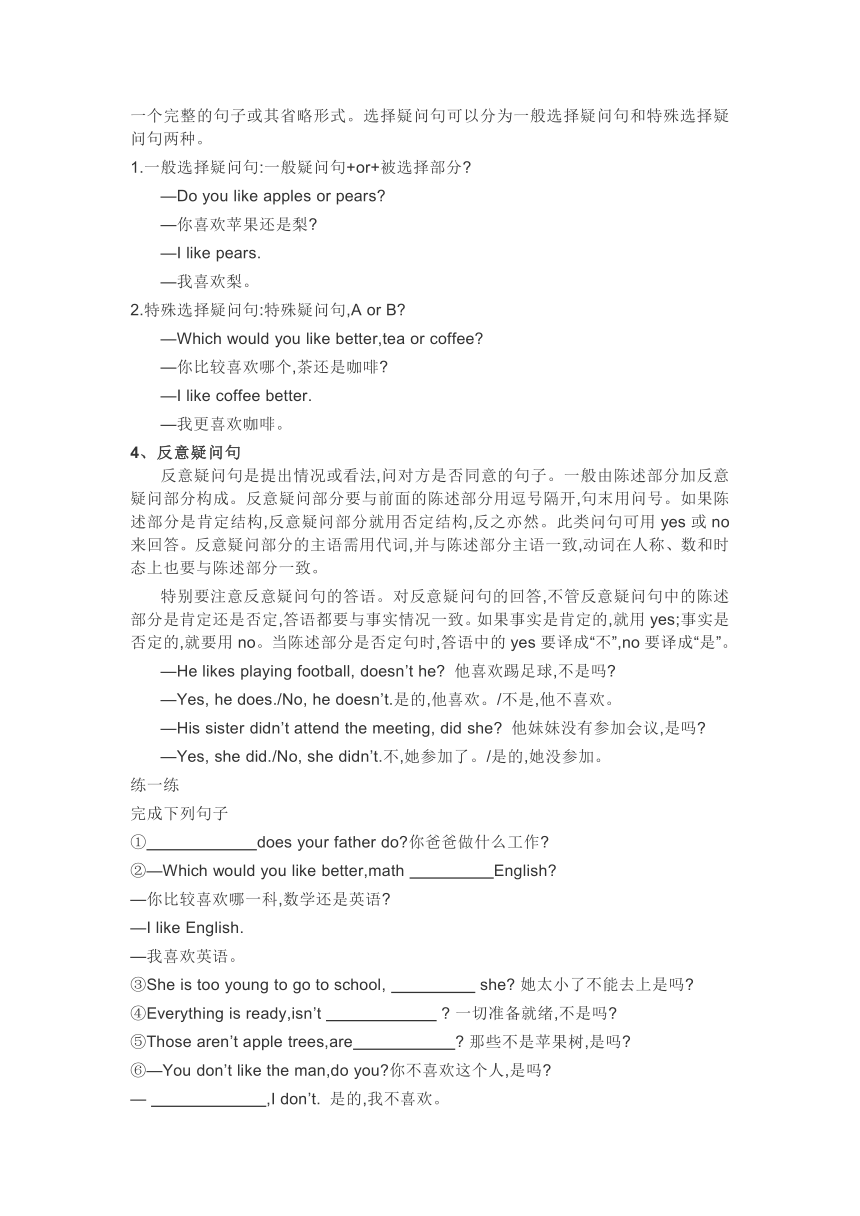
文档简介
2021中考英语专项训练:简单句
中考专项训练:简单句
本章节内容:1.
简单句的六种基本句型2.疑问句3.陈述句、感叹句、祈使句4.倒装句
1简单句的六种基本句型
1.主语+系动词+表语
此句型中的谓语动词为连系动词,作表语成分的有形容词、名词、代词、分词、不定式、介词短语等。常见的系动词有be动词(am/is/are/was/were)、感官系动词(look/sound/smell/taste/feel)、“变得类”(get/become/turn)等。
Mr.
Zheng
is
kind
and
patient.郑老师善良、有耐心。
The
story
sounds
interesting.
那个故事听起来很有趣。
The
weather
gets
warmer
in
spring.在春天,天气变得更暖和了。
2.主语+不及物动词
在此句型中,谓语动词是不及物动词,表达的意思已经很完整,所以不需要跟宾语。有时为了表示动作发生的频率、程度、原因、结果、目的、场所、时间等,可以带状语来修饰动词。
Tom
arrived
safely.汤姆安全地到达了。
Time
passes
quickly.时光飞逝。
The
sun
rises
in
the
east.
太阳从东方升起。
3.主语+及物动词+宾语
该句型中的谓语动词是及物动词,其后必须跟宾语才能使句意表达完整、准确。宾语可以由名词、代词或相当于名词的词或短语充当,如doing、to
do等形式。
Tom
reached
the
airport
safely.汤姆安全地到达了机场。
?They
enjoyed
themselves
very
much
last
night.
他们昨天晚上玩得很开心。
He
decided
to
buy
a
computer.他决定买一台电脑。
注意:当不及物动词与介词连用时,其后也可跟宾语。如:
Tom
arrived
at
the
airport
safely.汤姆安全地到达了机场。
?Ann
is
waiting
for
Kate
at
the
school
gate.安正在校门口等凯特。
4.主语+及物动词+间接宾语+直接宾语
英语中有些及物动词能跟双宾语,即间接宾语(指人)和直接宾语(指物)。通常情况下间接宾语在前,直接宾语在后。能跟双宾语的动词常见的有:ask,
bring,
take,
buy,
cost,
fetch,
give,
pass,
lend,
offer,
read,
send,
show,
teach,
tell,
write,
make,
get等。有时也可把间接宾语置于直接宾语后,此时间接宾语前需加介词for或to。
Could
you
pass
me
the
salt?
(=Could
you
pass
the
salt
to
me?)
请你把盐递给我好吗?
I
showed
him
my
pictures.(=I
showed
my
pictures
to
him.)
我给他看了我的照片。
He
made
his
mother
a
birthday
card.(=He
made
a
birthday
card
for
his
mother.)
他为他的妈妈制作了一张生日卡片。
注意:间接宾语后置与介词for连用的常见动词有buy(买),
make(制作),
get(去取来),
choose(选择)等。
5.主语+及物动词+宾语+宾语补足语
英语中,有些及物动词除能跟宾语外,有时还需加一个补足语,句意才完整。宾语补足语的作用是说明宾语的动作或状态。作宾语补足语的主要是名词、形容词、动词不定式和分词,副词和介词短语等也可以用作宾语补足语。
We
can
call
James
Jim.我们可以叫詹姆斯吉姆。
The
news
made
him
unhappy.
这个消息使他很不愉快。
She
asked
me
to
call
him
again.
她让我再给他打个电话。
Jenny
saw
Brian
buy
many
donuts.珍妮看到布赖恩买了许多面包圈。
I
will
not
let
you
in.我不会让你进去的。
注意:(1)后跟形容词作宾语补足语的动词有keep,
make,
find,
get,
think等。
(2)动词不定式作宾语补足语有以下三种情况:
①后跟带to的不定式作宾语补足语的动词常有ask,
tell,
teach,
wish,
advise,
encourage等。
②后跟不带to的不定式作宾语补足语的动词可归纳为:四看(see,
watch,
look
at,
notice)三让(make,
let,
have)二听(listen
to,
hear)一感觉(feel)。
③help后跟不定式作宾语补足语时,不定式既可带to,也可不带to。
My
father
often
helps
me(to)study
English.我父亲经常帮助我学习英语。
(3)后跟动词-ing形式作宾语补足语的动词有feel,
hear,
see,
watch,
keep,
find等。
We
found
a
man
lying
on
the
ground.我们发现一个男人躺在地上。
(4)后跟介词短语作宾语补足语的动词有keep,
find,
take等。
I’ll
keep
the
words
in
my
mind.我将记住这些话。
6.there
be
句型
本句型表示人或事物“存在”的概念,常译为“某地有某物”。此句型应注意以下两点:
(1)就近原则,即be动词要与离它较近的主语保持一致。如果是单个的主语,动词
be则随这个主语的数和人称而变化。如果是并列的主语,动词be一般随最靠近它的那个主语的人称和数而变化。
There
is
a
dictionary
on
the
desk.
书桌上有一本字典。
There
are
some
books
on
the
desk.书桌上有些书。
There
is
one
ruler
and
two
pens
on
the
desk.书桌上有一把尺子和两支钢笔。
(2)there
be句型可以有各种时态,且时态就由其中的动词be来体现。
There
will
be
a
football
game
this
afternoon.今天下午有一场足球比赛。
There
was
a
special
party
at
our
school
last
night.昨天晚上在我们学校有一个特别的聚会。
2疑问句
用以提问的句子叫疑问句,句末用问号。疑问句分为一般疑问句、特殊疑问句、选择疑问句和反意疑问句。
一、一般疑问句
一般疑问句用于询问事物或某种情况是否属实,希望对方给予肯定(yes)或否定(no)回答,读时用升调,它的基本结构为:①“be+主语+其他?”;②“助动词(或情态动词)+主语+谓语(动词原形)+其他?”。使用一般疑问句时应特别注意问句与答句在人称、数和时态上的一致。
对一般疑问句作肯定回答时,通常是:Yes,主语+be/助动词/情态动词;作否定回答时,通常是:No,主语+be/助动词/情态动词+not。
—Are
you
a
doctor?——你是医生吗?
—Yes,I
am.——是的,我是。
—No,I’m
not.——不,我不是。
—Do
you
like
playing
football?——你喜欢踢足球吗?
—Yes,I
do.——是的,我喜欢。
—No,I
don’t.——不,我不喜欢。
注意:一般疑问句通常是怎么问,怎么答,即用什么词提问,就用什么词回答,但有下列情况时例外:
(1)用其他词语代替yes或no来回答,从而使语气变得客气、委婉。
—Can
you
go
to
the
park
with
me?——你能与我一起去公园吗?
—I’m
afraid
not.I
have
a
lot
of
work
to
do.——恐怕不行。我有很多工作要做。
(2)否定的一般疑问句通常是以be动词、情态动词或助动词与not的缩略形式开头,往往表示惊讶、赞叹、怀疑等语气。
—Don’t
you
hear
of
that?(表示惊讶)——你没有听说过那件事吗?
—Yes,I
do.——不,我听说过。
—No,I
don’t.——是的,我没有听说过。
对否定的一般疑问句作简略回答时也用yes或no,但其汉语翻译与其原意正好相反,后面的陈述部分照常翻译。
二、特殊疑问句
用特殊疑问词引导的疑问句叫特殊疑问句。回答时不能使用yes或no。特殊疑问词包括疑问代词、疑问副词和疑问词组。
1.what疑问词小结
提问物品
What’s
this
in
English?
提问星期、日期
What
day
is
it
today?
What’s
the
date
today?
提问年级、班级
What
class
are
you
in?
提问颜色
What
colour
is
it?
提问时间
What’s?the
time
now?/What
time
is
it
now?
提问价格
What’s?the
price
of
the
house?
提问职业
What?is
your
father?/What
is
your
father’s
job?
What
does
your
father
do?
提问气温
What’s
the
temperature?
2.how疑问词小结
how怎样
how
long多长时间(提问时间段)
how
often多久一次(提问频率)
how
soon多久以后(对in短语提问)
how
many多少(提问可数名词的数量)
how
much多少(提问不可数名词的量,也可提问价格)
how?far多远(提问距离)
how?heavy多重
how
wide多宽
how
tall/high多高
how
old多大(提问年龄)
3.其他“wh-”疑问词小结
when什么时候;where哪里;which哪一个;who谁;whose谁的;why为什么
3、选择疑问句
提出两种或两种以上的情况,要求对方选择一种情况回答的问句叫选择疑问句。选择疑问句中的两种或两种以上的情况用or连接,回答时不能使用yes或no,而要用一个完整的句子或其省略形式。选择疑问句可以分为一般选择疑问句和特殊选择疑问句两种。
1.一般选择疑问句:一般疑问句+or+被选择部分?
—Do
you
like
apples
or
pears?
—你喜欢苹果还是梨?
—I
like
pears.
—我喜欢梨。
2.特殊选择疑问句:特殊疑问句,A
or
B?
—Which
would
you
like
better,tea
or
coffee?
—你比较喜欢哪个,茶还是咖啡?
—I
like
coffee
better.
—我更喜欢咖啡。
4、反意疑问句
反意疑问句是提出情况或看法,问对方是否同意的句子。一般由陈述部分加反意疑问部分构成。反意疑问部分要与前面的陈述部分用逗号隔开,句末用问号。如果陈述部分是肯定结构,反意疑问部分就用否定结构,反之亦然。此类问句可用yes或no来回答。反意疑问部分的主语需用代词,并与陈述部分主语一致,动词在人称、数和时态上也要与陈述部分一致。
特别要注意反意疑问句的答语。对反意疑问句的回答,不管反意疑问句中的陈述部分是肯定还是否定,答语都要与事实情况一致。如果事实是肯定的,就用yes;事实是否定的,就要用no。当陈述部分是否定句时,答语中的yes要译成“不”,no要译成“是”。
—He
likes
playing
football,
doesn’t
he?
他喜欢踢足球,不是吗?
—Yes,
he
does./No,
he
doesn’t.是的,他喜欢。/不是,他不喜欢。
—His
sister
didn’t
attend
the
meeting,
did
she?
他妹妹没有参加会议,是吗?
—Yes,
she
did./No,
she
didn’t.不,她参加了。/是的,她没参加。
练一练
完成下列句子
①?
?
?
?
?
?
?
?
?does
your
father
do?你爸爸做什么工作??
②—Which
would
you
like
better,math??
?
?
?
?
?
?English??
—你比较喜欢哪一科,数学还是英语?
—I
like
English.
—我喜欢英语。
③She
is
too
young
to
go
to
school,??
?
?
?
?
?
??she??她太小了不能去上是吗?
④Everything
is
ready,isn’t??
?
?
?
?
?
?
?
????一切准备就绪,不是吗?
⑤Those
aren’t
apple
trees,are?
?
?
?
?
?
?
????那些不是苹果树,是吗?
⑥—You
don’t
like
the
man,do
you?你不喜欢这个人,是吗?
—??
?
?
?
?
?
?
?
??,I
don’t.
是的,我不喜欢。
【答案】1.What?
2or?
3.is?
4.it?
5.they?
6.No
3陈述句、感叹句、祈使句
一、陈述句
陈述句用来陈述一件事或表达一种看法,有肯定和否定两种形式,句末通常用句号,读降调。
(一)陈述句的肯定式
结构:主语+谓语+其他。
That
boy
often
helps
others.那个男孩经常帮助别人。
I
went
to
the
cinema
yesterday.昨天我去看电影了。
(二)陈述句的否定式
1.be的否定式
(1)be用作系动词时,结构为:主语+be+not+表语+其他。
She
is
not
a
teacher.她不是一个老师。
(2)be用作助动词,用于be
doing/be
done等时态或被动语态中,结构为:主语+be+not+动词的现在分词或过去分词+其他。
Jim
isn’t
playing
football.吉姆没在踢足球。
The
sweater
isn’t
made
of
wool.这件毛衣不是羊毛做的。
2.助动词、情态动词的否定式
The
boy
doesn’t
do
housework
at
home.这个男孩在家不做家务。
3.除not外,其他否定词也可以构成否定句
(1)用no表示,no=not
any/a。
He
has
no
sister.=He
doesn’t
have
any
sisters.他没有姐妹。
(2)never绝不,从来不。
I
have
never
seen
such
a
man.我从没见过这样的人。
(3)little,few几乎没有。
There
are
few
students
in
the
classroom.教室里几乎没有学生。
(4)no
one/nobody
没有人。
No
one/Nobody
is
interested
in
the
book.没有人对这本书感兴趣。
(5)nothing什么也没有。
There
is
nothing
wrong
with
you.你没有什么问题。
(6)neither
of两者都不;none
of没有一个(用于三者或三者以上)。
Neither
of
them
has
ever
been
to
Beijing.他们两个都没有去过北京。
(7)seldom
?很少,hardly
几乎不。
I
can
hardly
say
a
word.我几乎不能说一句话。
(8)too……to
太……而不能……。
He
was
too
late
to
catch
the
bus.他来得太晚,没赶上公共汽车。
题组训练:完成句子
①Tom
was??
?
?
?
?
?
?
?
?at
home
yesterday.昨天汤姆不在家。?
②I?
?
?
?
?
?
?
?go
to
hospital.我很少去医院。?
【答案】1.not?
?2.seldom
二、感叹句
感叹句是用来表达人的特殊情感的句子,可以表达人的喜、怒、哀、乐等情感。感叹句可以是一个单词、一个不定式、一个由短语构成的独立句,也可以是由what或how引导的句子,句末常用感叹号。
(一)what引导的感叹句
1.What+a(n)+形容词+可数名词的单数形式(+主语+谓语)!
What
a
beautiful
girl
she
is!她是一个多么漂亮的女孩呀!
2.What+形容词+可数名词的复数形式(+主语+谓语)!
What
important
jobs
they
have
done!他们做了多么重要的工作啊!
3.What+形容词+不可数名词(+主语+谓语)!
What
good
news!多好的消息啊!
(二)how引导的感叹句
1.How+形容词或副词(+主语+谓语)!
How
interesting
the
dog
is!多么有趣的狗啊!
2.How+形容词+a/an+可数名词的单数形式(+主语+谓语)!
How
useful
a
subject
it
is!多么有用的一门科目啊!
3.How+主语+谓语!
How
time
flies!时间过得真快啊!
(三)一些特殊形式的感叹句
1.有时陈述句、祈使句或疑问句也可转化为感叹句,表示某种强烈的感情。
He
runs
so
fast!他跑得真快啊!
Do
read
it
carefully!一定要仔细阅读!
2.用一个词或词组表达强烈感情的句子也是感叹句。
Wonderful!好极了!Look
out!小心!
Great!太棒了!
3.以there,here等副词开头的感叹句。
There
she
is!她在那儿!
There
goes
the
bell!铃响了!
感叹句解题技巧:
?
?
?
?
?
?
?
?
??great
picture!Who
painted
it??
A.How?
?B.What???
C.How
a?
D.What
a
(1)看选项本身是否存在。
(2)看形容词后面有没有名词:①如果没有名词,则肯定选择how。
如:How
great
(the
picture/it
is)!
②如果有名词,则继续看形容词和名词之间有没有其他的词。如果有其他的词,则肯定选how。
如:How
great
the/his
picture
is!如果没有其他的词,则肯定选择what开头的选项。
如果形容词后为不可数名词或可数名词复数,就选择what。
如:What
bad
weather
(it
is)!
What
great
pictures(they
are)!
如果形容词后为可数名词单数,则要看形容词是否以元音音素开头来确定填what
a还是what
an。
如:What
a
great
picture
(it
is)!
What
an
interesting
story
(it
is)!
三、祈使句
(一)祈使句的结构及用法
祈使句表示命令、请求、建议或劝告等。主语通常被省略,谓语动词用原形,句末用感叹号或句号,读降调。
1.肯定的祈使句
(1)句型:动词原形(省略主语)+其他成分。
Come
in!进来!
Be
quiet!安静!
(2)有时为了加强语气,可以在动词之前加上do,表示“务必,一定”。
Do
come
on
time!一定要准时来!
Do
look
out!一定要小心!
2.否定的祈使句
(1)Don’t+动词原形+其他成分。
Don’t
be
late.不要迟到。
Don’t
come
out.不要出去。
(2)never+动词原形。
Never
fear!不要害怕!
(二)祈使句需要注意的一些情况
1.有时为了表示委婉的语气,可在句首或句尾加上please,但please加在句尾时,前面要用逗号隔开。
Please
sit
down.请坐。
Stand
up,please.请起立。
2.在意思较为明显的情况下,可把谓语动词省去。
This
way,please.请这边走。
3.有时为了明确地向对方提出请求或发出命令,可加称呼语,但称呼语要与句子隔开。
Turn
off
the
light,Jim.吉姆,关灯。
4.某些名词、形容词或副词等后面加感叹号,也可作为祈使句使用。
Hands
up!举起手来!
Taxi!出租车!
5.祈使句的回答用一般将来时。
—Please
come
to
school
on
time
tomorrow.请明天按时来学校。
—OK,I
will.好的,我会的。
6.用于“祈使句+and/or+陈述句(表结果)”结构。
Work
harder,
and
you
will
find
it
not
difficult
to
learn.再用功些,你会发现它不难
三、倒装句
一、so和neither开头的倒装句
1.相同点:
这两种结构常用来说明前面所说的情况也同样适用于后面的人或物,意思是“某人/物也是这样”。这两种结构中的助动词/be动词/情态动词在形式上与前句的谓语保持一致,而其单复数形式则由后句的主语决定。
Lucy
is
a
good
student.So
is
Lily.露西是好学生,莉莉也是好学生。
2.这两种结构的不同点:
“so+助动词/be动词/情态动词+主语”依附于肯定句,表示前边的肯定情况也适合后边的人(物),意为“……也……”,而neither+助动词/be动词/情态动词+主语,表示前边的否定情况也适合后边的人(物),意为“……也不……”。
Tom
watched
TV
last
night.So
did
Ann.汤姆昨晚看电视了,安也看了。
Mary
didn’t
watch
TV
last
night.Neither
did
Jim.玛丽昨晚没有看电视,吉姆也没看。
二、句型“so+be动词/助动词/情态动词+主语”和“so+主语+be动词/助动词/情态动词”的区别
1.句型“so+be动词/助动词/情态动词+主语”为倒装句的结构,意为“……也是”。
—Tom
passed
the
driving
test.—汤姆通过驾驶考试了。
—So
did
he.——他也通过了。(“他”指的是另外一位男士而不指汤姆)
2.句型“so+主语+be动词/助动词/情态动词”表示“的确如此”。
—Tom
passed
the
driving
test.—汤姆通过驾驶考试了。
—So
he
did.—他确实通过了。(“他”指的就是汤姆)
中考试练:
1.— ?will
they
finish
printing
the
newspaper??
—In
five
hours.
A.How
much????B.How
often????C.How
soon????D.How
long
【答案】C
【解析】句意:——他们多久之后将印完这些报纸?——五小时后。本题考查特殊疑问句。A选项意为“多少,多少钱”,B选项意为“多久一次”,C选项意为“多久之后”,D选项意为“多久”,由此可知本题选择C。
2.—Kate
won
first
prize
in
the
singing
competition.
— ?pleasant
surprise
this
gave
her
classmates!?
A.What
a????B.How????C.What????D.How
a
【答案】A
【解析】句意:——凯特在唱歌比赛中赢得了第一名。——这给了她的同学们多么令人愉快的惊喜啊!本题考查感叹句的用法。本空后surprise为可数名词单数,由此可知本题选择A。
3. exciting
it
is!
Our
country
launched
her
first
home-made
aircraft
carrier(国产航空母舰)on
April
26
in
Dalian.?
A.How????B.What????C.How
an????D.What
an
【答案】 A 句意:多么令人激动啊!在大连,我们的国家于4月26日使第一艘国产航空母舰下水了。本题考查感叹句。exciting为形容词且其后没有名词,故本空用how,选择A。
4.—Mom,
can
I
go
dancing
this
evening?
— your
homework
first,
and
then
we’ll
talk
about
it.?
A.Finish????B.Finishing????C.To
finish????D.Finished
【答案】A
【解析】句意:——妈妈,我今晚可以去跳舞吗?——先完成作业,然后我们再讨论这件事。本题考查祈使句。祈使句以动词原形开头,故选择A。
5.— can
you
finish
your
homework??
—In
about
one
and
a
half
hours.
A.How
fast????B.How
soon????C.How
often????D.How
long
【答案】B
【解析】句意:——你多久之后可以完成你的作业?——大约一个半小时后。由答语可知本题用how
soon
提问。
6.— exciting
movies
they
are!?
—I
agree
with
you.
I
also
like
them
very
much.
A.What????B.What
an????C.How????D.How
an
【答案】A
【解析】句意:——它们是多么令人激动的电影啊!——我同意你的观点,我也非常喜欢它们。exciting
movies为名词短语,故排除C和D。又因为名词movies是复数形式,故选A。
二、连词成句
1.in,
is,
room,
who,
the
?
?
?
?
?
?
?
?
?
?
?
?
?
?
?
?
?
?
?
?
?
?
?
?
?
?
?
???
2.grow,
here,
nothing,
well,
can
?
?
?
?
?
?
?
?
?
?
?
?
?
?
?
?
?
?
?
?
?
?
?
?
?
?
?
?
??.?
3.good,
brought,
you,
news,
what,
us
?
?
?
?
?
?
?
?
?
?
?
?
?
?
?
?
?
?
?
?
?
?
?
?
?
?
?
?
??!?
4.will,
two,
tomorrow,
there,
meetings,
be
?
?
?
?
?
?
?
?
?
?
?
?
?
?
?
?
?
?
?
?
?
?
?
?
?
?
?
?
?
?.?
5.come,
the,
see,
in,
didn’t,
teacher,
you
?
?
?
?
?
?
?
?
?
?
?
?
?
?
?
?
?
?
?
?
?
?
?
?
?
?
?
?
?
???
【答案】
1.Who
is
in
the
room 句意:谁在房间里?
2.Nothing
can
grow
well
here/Nothing
here
can
grow
well句意:没有什么能在这里长得好。/这里没有什么能长得好。
3.What
good
news
you
brought
us句意:你带给我们多么好的消息啊!
4.There
will
be
two
meetings
tomorrow/Tomorrow
there
will
be
two
meetings 句意:明天将会有两个会。
5.Didn’t
you
see
the
teacher
come
in/Didn’t
the
teacher
see
you
come
in 句意:难道你没看到老师进来吗?/难道老师没看到你进来吗?
二
1.like,
you,
do,
the
sweater
?
?
?
?
?
?
?
?
?
?
?
?
?
?
?
?
?
?
?
?
?
?
?
?
?
???
2.friend,
best,
is,
who,
your
?
?
?
?
?
?
?
?
?
?
?
?
?
?
?
?
?
?
?
?
?
?
?
?
?
?
???
3.books,
often,
she,
in
the
morning,
reads
?
?
?
?
?
?
?
?
?
?
?
?
?
?
?
?
?
?
?
?
?
?
?
?
?
?
??.?
4.enjoy,
to,
try,
life,
your
?
?
?
?
?
?
?
?
?
?
?
?
?
?
?
?
?
?
?
?
?
?
?
?
?
?
??.?
5.rides,
he,
how,
the,
fast,
bike
?
?
?
?
?
?
?
?
?
?
?
?
?
?
?
?
?
?
?
?
?
?
?
?
?
?
?
?!?
【答案】
1.Do
you
like
the
sweater句意:你喜欢这件毛衣吗?
2.Who
is
your
best
friend句意:谁是你最好的朋友?
3.She
often
reads
books
in
the
morning 句意:她经常在早上读书。
4.Try
to
enjoy
your
life句意:努力享受你的生活。
5.How
fast
he
rides
the
bike 句意:他骑自行车真快啊!
三
1.next
week,
will,
TV,
he,
watch
?
?
?
?
?
?
?
?
?
?
?
?
?
?
?
?
?
?
?
?
?
?
?
?
?
?
??.?
2.afraid
of,
Li
Gang,
talking
to,
is,
strangers
?
?
?
?
?
?
?
?
?
?
?
?
?
?
?
?
?
?
?
?
?
?
?
?
?
?
?
?.?
3.him,
way,
to,
happened,
on,
what,
the
?
?
?
?
?
?
?
?
?
?
?
?
?
?
?
?
?
?
?
?
?
?
?
?
?
?
?
???
4.too
much,
in
the
street,
snow,
there
is
?
?
?
?
?
?
?
?
?
?
?
?
?
?
?
?
?
?
?
?
?
?
?
?
?
?
?
??.?
5.interesting,
it,
what,
an,
is,
collection
?
?
?
?
?
?
?
?
?
?
?
?
?
?
?
?
?
?
?
?
?
?
?
?
?
?
?
?!?
【答案】
1.He
will
watch
TV
next
week 句意:他下周将看电视。
2.Li
Gang
is
afraid
of
talking
to
strangers 句意:李刚害怕和陌生人讲话。
3.What
happened
to
him
on
the
way 句意:在路上他发生什么事了?
4.There
is
too
much
snow
in
the
street 句意:大街上有太多的雪。
5.What
an
interesting
collection
it
is 句意:它是一个多么有趣的收藏啊!
四
1.a,
is,
what,
nice,
he,
man
?
?
?
?
?
?
?
?
?
?
?
?
?
?
?
?
?
?
?
?
?
?
?
?
?
?!?
2.right,
have,
answer,
found
out,
the,
you
?
?
?
?
?
?
?
?
?
?
?
?
?
?
?
?
?
?
?
?
?
?
?
?
?
???
3.to,
it’s,
shop,
cheaper,
online,
much
?
?
?
?
?
?
?
?
?
?
?
?
?
?
?
?
?
?
?
?
?
?
?
?
?
??.?
4.is,
your,
car,
man,
who,
the,
beside
?
?
?
?
?
?
?
?
?
?
?
?
?
?
?
?
?
?
?
?
?
?
?
?
?
???
5.nothing,
leg,
there,
wrong,
is,
her,
with
?
?
?
?
?
?
?
?
?
?
?
?
?
?
?
?
?
?
?
?
?
?
?
?
?
??.?
【答案】
1.What
a
nice
man
he
is 句意:他是一个多么好的男人啊!
2.Have
you
found
out
the
right
answer 句意:你已经弄清楚正确的答案了吗?
3.It’s
much
cheaper
to
shop
online 句意:在网上购物要便宜得多。
4.Who
is
the
man
beside
your
car 句意:你的车旁边的那个男人是谁?
5.There
is
nothing
wrong
with
her
leg 句意:她的腿没有毛病。
五
1.bags,
these,
yours,
are
?
?
?
?
?
?
?
?
?
?
?
?
?
?
?
?
?
?
?
?
?
?
?
?
?
???
2.for,
be,
don’t,
class,
late
?
?
?
?
?
?
?
?
?
?
?
?
?
?
?
?
?
?
?
?
?
?
?
?
?
??.?
3.want,
do,
you,
what,
be,
to
?
?
?
?
?
?
?
?
?
?
?
?
?
?
?
?
?
?
?
?
?
?
?
?
?
???
4.have,
to,
needs,
she,
a,
rest,
good
?
?
?
?
?
?
?
?
?
?
?
?
?
?
?
?
?
?
?
?
?
?
?
?
?
??.?
5.the,
a,
from,
library,
book,
I,
yesterday,
borrowed
?
?
?
?
?
?
?
?
?
?
?
?
?
?
?
?
?
?
?
?
?
?
?
?
?
?
??.?
【答案】
1.Are
these
bags
yours 句意:这些袋子是你的吗?
2.Don’t
be
late
for
class 句意:上课别迟到。
3.What
do
you
want
to
be 句意:你想做什么?
4.She
needs
to
have
a
good
rest 句意:她需要好好休息一下。
5.I
borrowed
a
book
from
the
library
yesterday 句意:昨天我从图书馆借了一本书。
六
1.you,seen,giraffes,have
?
?
?
?
?
?
?
?
?
?
?
?
?
?
?
?
?
?
?
?
?
?
?
?
????
2.the,they,tallest,are,animals
?
?
?
?
?
?
?
?
?
?
?
?
?
?
?
?
?
?
?
?
?
?
?
?
?
?.?
3.to,they,us,friendly,are
?
?
?
?
?
?
?
?
?
?
?
?
?
?
?
?
?
?
?
?
?
?
?
?
?
?.?
4.eat,usually,leaves,they,green
?
?
?
?
?
?
?
?
?
?
?
?
?
?
?
?
?
?
?
?
?
?
?
?
?
??.?
5.me,can,make
friends
with,they
?
?
?
?
?
?
?
?
?
?
?
?
?
?
?
?
?
?
?
?
?
?
?
?
?
????
【答案】
1.Have
you
seen
giraffes
2.They
are
the
tallest
animals
3.They
are
friendly
to
us
4.They
usually
eat
green
leaves
5.Can
they
make
friends
with
me
-
End
-
中考专项训练:简单句
本章节内容:1.
简单句的六种基本句型2.疑问句3.陈述句、感叹句、祈使句4.倒装句
1简单句的六种基本句型
1.主语+系动词+表语
此句型中的谓语动词为连系动词,作表语成分的有形容词、名词、代词、分词、不定式、介词短语等。常见的系动词有be动词(am/is/are/was/were)、感官系动词(look/sound/smell/taste/feel)、“变得类”(get/become/turn)等。
Mr.
Zheng
is
kind
and
patient.郑老师善良、有耐心。
The
story
sounds
interesting.
那个故事听起来很有趣。
The
weather
gets
warmer
in
spring.在春天,天气变得更暖和了。
2.主语+不及物动词
在此句型中,谓语动词是不及物动词,表达的意思已经很完整,所以不需要跟宾语。有时为了表示动作发生的频率、程度、原因、结果、目的、场所、时间等,可以带状语来修饰动词。
Tom
arrived
safely.汤姆安全地到达了。
Time
passes
quickly.时光飞逝。
The
sun
rises
in
the
east.
太阳从东方升起。
3.主语+及物动词+宾语
该句型中的谓语动词是及物动词,其后必须跟宾语才能使句意表达完整、准确。宾语可以由名词、代词或相当于名词的词或短语充当,如doing、to
do等形式。
Tom
reached
the
airport
safely.汤姆安全地到达了机场。
?They
enjoyed
themselves
very
much
last
night.
他们昨天晚上玩得很开心。
He
decided
to
buy
a
computer.他决定买一台电脑。
注意:当不及物动词与介词连用时,其后也可跟宾语。如:
Tom
arrived
at
the
airport
safely.汤姆安全地到达了机场。
?Ann
is
waiting
for
Kate
at
the
school
gate.安正在校门口等凯特。
4.主语+及物动词+间接宾语+直接宾语
英语中有些及物动词能跟双宾语,即间接宾语(指人)和直接宾语(指物)。通常情况下间接宾语在前,直接宾语在后。能跟双宾语的动词常见的有:ask,
bring,
take,
buy,
cost,
fetch,
give,
pass,
lend,
offer,
read,
send,
show,
teach,
tell,
write,
make,
get等。有时也可把间接宾语置于直接宾语后,此时间接宾语前需加介词for或to。
Could
you
pass
me
the
salt?
(=Could
you
pass
the
salt
to
me?)
请你把盐递给我好吗?
I
showed
him
my
pictures.(=I
showed
my
pictures
to
him.)
我给他看了我的照片。
He
made
his
mother
a
birthday
card.(=He
made
a
birthday
card
for
his
mother.)
他为他的妈妈制作了一张生日卡片。
注意:间接宾语后置与介词for连用的常见动词有buy(买),
make(制作),
get(去取来),
choose(选择)等。
5.主语+及物动词+宾语+宾语补足语
英语中,有些及物动词除能跟宾语外,有时还需加一个补足语,句意才完整。宾语补足语的作用是说明宾语的动作或状态。作宾语补足语的主要是名词、形容词、动词不定式和分词,副词和介词短语等也可以用作宾语补足语。
We
can
call
James
Jim.我们可以叫詹姆斯吉姆。
The
news
made
him
unhappy.
这个消息使他很不愉快。
She
asked
me
to
call
him
again.
她让我再给他打个电话。
Jenny
saw
Brian
buy
many
donuts.珍妮看到布赖恩买了许多面包圈。
I
will
not
let
you
in.我不会让你进去的。
注意:(1)后跟形容词作宾语补足语的动词有keep,
make,
find,
get,
think等。
(2)动词不定式作宾语补足语有以下三种情况:
①后跟带to的不定式作宾语补足语的动词常有ask,
tell,
teach,
wish,
advise,
encourage等。
②后跟不带to的不定式作宾语补足语的动词可归纳为:四看(see,
watch,
look
at,
notice)三让(make,
let,
have)二听(listen
to,
hear)一感觉(feel)。
③help后跟不定式作宾语补足语时,不定式既可带to,也可不带to。
My
father
often
helps
me(to)study
English.我父亲经常帮助我学习英语。
(3)后跟动词-ing形式作宾语补足语的动词有feel,
hear,
see,
watch,
keep,
find等。
We
found
a
man
lying
on
the
ground.我们发现一个男人躺在地上。
(4)后跟介词短语作宾语补足语的动词有keep,
find,
take等。
I’ll
keep
the
words
in
my
mind.我将记住这些话。
6.there
be
句型
本句型表示人或事物“存在”的概念,常译为“某地有某物”。此句型应注意以下两点:
(1)就近原则,即be动词要与离它较近的主语保持一致。如果是单个的主语,动词
be则随这个主语的数和人称而变化。如果是并列的主语,动词be一般随最靠近它的那个主语的人称和数而变化。
There
is
a
dictionary
on
the
desk.
书桌上有一本字典。
There
are
some
books
on
the
desk.书桌上有些书。
There
is
one
ruler
and
two
pens
on
the
desk.书桌上有一把尺子和两支钢笔。
(2)there
be句型可以有各种时态,且时态就由其中的动词be来体现。
There
will
be
a
football
game
this
afternoon.今天下午有一场足球比赛。
There
was
a
special
party
at
our
school
last
night.昨天晚上在我们学校有一个特别的聚会。
2疑问句
用以提问的句子叫疑问句,句末用问号。疑问句分为一般疑问句、特殊疑问句、选择疑问句和反意疑问句。
一、一般疑问句
一般疑问句用于询问事物或某种情况是否属实,希望对方给予肯定(yes)或否定(no)回答,读时用升调,它的基本结构为:①“be+主语+其他?”;②“助动词(或情态动词)+主语+谓语(动词原形)+其他?”。使用一般疑问句时应特别注意问句与答句在人称、数和时态上的一致。
对一般疑问句作肯定回答时,通常是:Yes,主语+be/助动词/情态动词;作否定回答时,通常是:No,主语+be/助动词/情态动词+not。
—Are
you
a
doctor?——你是医生吗?
—Yes,I
am.——是的,我是。
—No,I’m
not.——不,我不是。
—Do
you
like
playing
football?——你喜欢踢足球吗?
—Yes,I
do.——是的,我喜欢。
—No,I
don’t.——不,我不喜欢。
注意:一般疑问句通常是怎么问,怎么答,即用什么词提问,就用什么词回答,但有下列情况时例外:
(1)用其他词语代替yes或no来回答,从而使语气变得客气、委婉。
—Can
you
go
to
the
park
with
me?——你能与我一起去公园吗?
—I’m
afraid
not.I
have
a
lot
of
work
to
do.——恐怕不行。我有很多工作要做。
(2)否定的一般疑问句通常是以be动词、情态动词或助动词与not的缩略形式开头,往往表示惊讶、赞叹、怀疑等语气。
—Don’t
you
hear
of
that?(表示惊讶)——你没有听说过那件事吗?
—Yes,I
do.——不,我听说过。
—No,I
don’t.——是的,我没有听说过。
对否定的一般疑问句作简略回答时也用yes或no,但其汉语翻译与其原意正好相反,后面的陈述部分照常翻译。
二、特殊疑问句
用特殊疑问词引导的疑问句叫特殊疑问句。回答时不能使用yes或no。特殊疑问词包括疑问代词、疑问副词和疑问词组。
1.what疑问词小结
提问物品
What’s
this
in
English?
提问星期、日期
What
day
is
it
today?
What’s
the
date
today?
提问年级、班级
What
class
are
you
in?
提问颜色
What
colour
is
it?
提问时间
What’s?the
time
now?/What
time
is
it
now?
提问价格
What’s?the
price
of
the
house?
提问职业
What?is
your
father?/What
is
your
father’s
job?
What
does
your
father
do?
提问气温
What’s
the
temperature?
2.how疑问词小结
how怎样
how
long多长时间(提问时间段)
how
often多久一次(提问频率)
how
soon多久以后(对in短语提问)
how
many多少(提问可数名词的数量)
how
much多少(提问不可数名词的量,也可提问价格)
how?far多远(提问距离)
how?heavy多重
how
wide多宽
how
tall/high多高
how
old多大(提问年龄)
3.其他“wh-”疑问词小结
when什么时候;where哪里;which哪一个;who谁;whose谁的;why为什么
3、选择疑问句
提出两种或两种以上的情况,要求对方选择一种情况回答的问句叫选择疑问句。选择疑问句中的两种或两种以上的情况用or连接,回答时不能使用yes或no,而要用一个完整的句子或其省略形式。选择疑问句可以分为一般选择疑问句和特殊选择疑问句两种。
1.一般选择疑问句:一般疑问句+or+被选择部分?
—Do
you
like
apples
or
pears?
—你喜欢苹果还是梨?
—I
like
pears.
—我喜欢梨。
2.特殊选择疑问句:特殊疑问句,A
or
B?
—Which
would
you
like
better,tea
or
coffee?
—你比较喜欢哪个,茶还是咖啡?
—I
like
coffee
better.
—我更喜欢咖啡。
4、反意疑问句
反意疑问句是提出情况或看法,问对方是否同意的句子。一般由陈述部分加反意疑问部分构成。反意疑问部分要与前面的陈述部分用逗号隔开,句末用问号。如果陈述部分是肯定结构,反意疑问部分就用否定结构,反之亦然。此类问句可用yes或no来回答。反意疑问部分的主语需用代词,并与陈述部分主语一致,动词在人称、数和时态上也要与陈述部分一致。
特别要注意反意疑问句的答语。对反意疑问句的回答,不管反意疑问句中的陈述部分是肯定还是否定,答语都要与事实情况一致。如果事实是肯定的,就用yes;事实是否定的,就要用no。当陈述部分是否定句时,答语中的yes要译成“不”,no要译成“是”。
—He
likes
playing
football,
doesn’t
he?
他喜欢踢足球,不是吗?
—Yes,
he
does./No,
he
doesn’t.是的,他喜欢。/不是,他不喜欢。
—His
sister
didn’t
attend
the
meeting,
did
she?
他妹妹没有参加会议,是吗?
—Yes,
she
did./No,
she
didn’t.不,她参加了。/是的,她没参加。
练一练
完成下列句子
①?
?
?
?
?
?
?
?
?does
your
father
do?你爸爸做什么工作??
②—Which
would
you
like
better,math??
?
?
?
?
?
?English??
—你比较喜欢哪一科,数学还是英语?
—I
like
English.
—我喜欢英语。
③She
is
too
young
to
go
to
school,??
?
?
?
?
?
??she??她太小了不能去上是吗?
④Everything
is
ready,isn’t??
?
?
?
?
?
?
?
????一切准备就绪,不是吗?
⑤Those
aren’t
apple
trees,are?
?
?
?
?
?
?
????那些不是苹果树,是吗?
⑥—You
don’t
like
the
man,do
you?你不喜欢这个人,是吗?
—??
?
?
?
?
?
?
?
??,I
don’t.
是的,我不喜欢。
【答案】1.What?
2or?
3.is?
4.it?
5.they?
6.No
3陈述句、感叹句、祈使句
一、陈述句
陈述句用来陈述一件事或表达一种看法,有肯定和否定两种形式,句末通常用句号,读降调。
(一)陈述句的肯定式
结构:主语+谓语+其他。
That
boy
often
helps
others.那个男孩经常帮助别人。
I
went
to
the
cinema
yesterday.昨天我去看电影了。
(二)陈述句的否定式
1.be的否定式
(1)be用作系动词时,结构为:主语+be+not+表语+其他。
She
is
not
a
teacher.她不是一个老师。
(2)be用作助动词,用于be
doing/be
done等时态或被动语态中,结构为:主语+be+not+动词的现在分词或过去分词+其他。
Jim
isn’t
playing
football.吉姆没在踢足球。
The
sweater
isn’t
made
of
wool.这件毛衣不是羊毛做的。
2.助动词、情态动词的否定式
The
boy
doesn’t
do
housework
at
home.这个男孩在家不做家务。
3.除not外,其他否定词也可以构成否定句
(1)用no表示,no=not
any/a。
He
has
no
sister.=He
doesn’t
have
any
sisters.他没有姐妹。
(2)never绝不,从来不。
I
have
never
seen
such
a
man.我从没见过这样的人。
(3)little,few几乎没有。
There
are
few
students
in
the
classroom.教室里几乎没有学生。
(4)no
one/nobody
没有人。
No
one/Nobody
is
interested
in
the
book.没有人对这本书感兴趣。
(5)nothing什么也没有。
There
is
nothing
wrong
with
you.你没有什么问题。
(6)neither
of两者都不;none
of没有一个(用于三者或三者以上)。
Neither
of
them
has
ever
been
to
Beijing.他们两个都没有去过北京。
(7)seldom
?很少,hardly
几乎不。
I
can
hardly
say
a
word.我几乎不能说一句话。
(8)too……to
太……而不能……。
He
was
too
late
to
catch
the
bus.他来得太晚,没赶上公共汽车。
题组训练:完成句子
①Tom
was??
?
?
?
?
?
?
?
?at
home
yesterday.昨天汤姆不在家。?
②I?
?
?
?
?
?
?
?go
to
hospital.我很少去医院。?
【答案】1.not?
?2.seldom
二、感叹句
感叹句是用来表达人的特殊情感的句子,可以表达人的喜、怒、哀、乐等情感。感叹句可以是一个单词、一个不定式、一个由短语构成的独立句,也可以是由what或how引导的句子,句末常用感叹号。
(一)what引导的感叹句
1.What+a(n)+形容词+可数名词的单数形式(+主语+谓语)!
What
a
beautiful
girl
she
is!她是一个多么漂亮的女孩呀!
2.What+形容词+可数名词的复数形式(+主语+谓语)!
What
important
jobs
they
have
done!他们做了多么重要的工作啊!
3.What+形容词+不可数名词(+主语+谓语)!
What
good
news!多好的消息啊!
(二)how引导的感叹句
1.How+形容词或副词(+主语+谓语)!
How
interesting
the
dog
is!多么有趣的狗啊!
2.How+形容词+a/an+可数名词的单数形式(+主语+谓语)!
How
useful
a
subject
it
is!多么有用的一门科目啊!
3.How+主语+谓语!
How
time
flies!时间过得真快啊!
(三)一些特殊形式的感叹句
1.有时陈述句、祈使句或疑问句也可转化为感叹句,表示某种强烈的感情。
He
runs
so
fast!他跑得真快啊!
Do
read
it
carefully!一定要仔细阅读!
2.用一个词或词组表达强烈感情的句子也是感叹句。
Wonderful!好极了!Look
out!小心!
Great!太棒了!
3.以there,here等副词开头的感叹句。
There
she
is!她在那儿!
There
goes
the
bell!铃响了!
感叹句解题技巧:
?
?
?
?
?
?
?
?
??great
picture!Who
painted
it??
A.How?
?B.What???
C.How
a?
D.What
a
(1)看选项本身是否存在。
(2)看形容词后面有没有名词:①如果没有名词,则肯定选择how。
如:How
great
(the
picture/it
is)!
②如果有名词,则继续看形容词和名词之间有没有其他的词。如果有其他的词,则肯定选how。
如:How
great
the/his
picture
is!如果没有其他的词,则肯定选择what开头的选项。
如果形容词后为不可数名词或可数名词复数,就选择what。
如:What
bad
weather
(it
is)!
What
great
pictures(they
are)!
如果形容词后为可数名词单数,则要看形容词是否以元音音素开头来确定填what
a还是what
an。
如:What
a
great
picture
(it
is)!
What
an
interesting
story
(it
is)!
三、祈使句
(一)祈使句的结构及用法
祈使句表示命令、请求、建议或劝告等。主语通常被省略,谓语动词用原形,句末用感叹号或句号,读降调。
1.肯定的祈使句
(1)句型:动词原形(省略主语)+其他成分。
Come
in!进来!
Be
quiet!安静!
(2)有时为了加强语气,可以在动词之前加上do,表示“务必,一定”。
Do
come
on
time!一定要准时来!
Do
look
out!一定要小心!
2.否定的祈使句
(1)Don’t+动词原形+其他成分。
Don’t
be
late.不要迟到。
Don’t
come
out.不要出去。
(2)never+动词原形。
Never
fear!不要害怕!
(二)祈使句需要注意的一些情况
1.有时为了表示委婉的语气,可在句首或句尾加上please,但please加在句尾时,前面要用逗号隔开。
Please
sit
down.请坐。
Stand
up,please.请起立。
2.在意思较为明显的情况下,可把谓语动词省去。
This
way,please.请这边走。
3.有时为了明确地向对方提出请求或发出命令,可加称呼语,但称呼语要与句子隔开。
Turn
off
the
light,Jim.吉姆,关灯。
4.某些名词、形容词或副词等后面加感叹号,也可作为祈使句使用。
Hands
up!举起手来!
Taxi!出租车!
5.祈使句的回答用一般将来时。
—Please
come
to
school
on
time
tomorrow.请明天按时来学校。
—OK,I
will.好的,我会的。
6.用于“祈使句+and/or+陈述句(表结果)”结构。
Work
harder,
and
you
will
find
it
not
difficult
to
learn.再用功些,你会发现它不难
三、倒装句
一、so和neither开头的倒装句
1.相同点:
这两种结构常用来说明前面所说的情况也同样适用于后面的人或物,意思是“某人/物也是这样”。这两种结构中的助动词/be动词/情态动词在形式上与前句的谓语保持一致,而其单复数形式则由后句的主语决定。
Lucy
is
a
good
student.So
is
Lily.露西是好学生,莉莉也是好学生。
2.这两种结构的不同点:
“so+助动词/be动词/情态动词+主语”依附于肯定句,表示前边的肯定情况也适合后边的人(物),意为“……也……”,而neither+助动词/be动词/情态动词+主语,表示前边的否定情况也适合后边的人(物),意为“……也不……”。
Tom
watched
TV
last
night.So
did
Ann.汤姆昨晚看电视了,安也看了。
Mary
didn’t
watch
TV
last
night.Neither
did
Jim.玛丽昨晚没有看电视,吉姆也没看。
二、句型“so+be动词/助动词/情态动词+主语”和“so+主语+be动词/助动词/情态动词”的区别
1.句型“so+be动词/助动词/情态动词+主语”为倒装句的结构,意为“……也是”。
—Tom
passed
the
driving
test.—汤姆通过驾驶考试了。
—So
did
he.——他也通过了。(“他”指的是另外一位男士而不指汤姆)
2.句型“so+主语+be动词/助动词/情态动词”表示“的确如此”。
—Tom
passed
the
driving
test.—汤姆通过驾驶考试了。
—So
he
did.—他确实通过了。(“他”指的就是汤姆)
中考试练:
1.— ?will
they
finish
printing
the
newspaper??
—In
five
hours.
A.How
much????B.How
often????C.How
soon????D.How
long
【答案】C
【解析】句意:——他们多久之后将印完这些报纸?——五小时后。本题考查特殊疑问句。A选项意为“多少,多少钱”,B选项意为“多久一次”,C选项意为“多久之后”,D选项意为“多久”,由此可知本题选择C。
2.—Kate
won
first
prize
in
the
singing
competition.
— ?pleasant
surprise
this
gave
her
classmates!?
A.What
a????B.How????C.What????D.How
a
【答案】A
【解析】句意:——凯特在唱歌比赛中赢得了第一名。——这给了她的同学们多么令人愉快的惊喜啊!本题考查感叹句的用法。本空后surprise为可数名词单数,由此可知本题选择A。
3. exciting
it
is!
Our
country
launched
her
first
home-made
aircraft
carrier(国产航空母舰)on
April
26
in
Dalian.?
A.How????B.What????C.How
an????D.What
an
【答案】 A 句意:多么令人激动啊!在大连,我们的国家于4月26日使第一艘国产航空母舰下水了。本题考查感叹句。exciting为形容词且其后没有名词,故本空用how,选择A。
4.—Mom,
can
I
go
dancing
this
evening?
— your
homework
first,
and
then
we’ll
talk
about
it.?
A.Finish????B.Finishing????C.To
finish????D.Finished
【答案】A
【解析】句意:——妈妈,我今晚可以去跳舞吗?——先完成作业,然后我们再讨论这件事。本题考查祈使句。祈使句以动词原形开头,故选择A。
5.— can
you
finish
your
homework??
—In
about
one
and
a
half
hours.
A.How
fast????B.How
soon????C.How
often????D.How
long
【答案】B
【解析】句意:——你多久之后可以完成你的作业?——大约一个半小时后。由答语可知本题用how
soon
提问。
6.— exciting
movies
they
are!?
—I
agree
with
you.
I
also
like
them
very
much.
A.What????B.What
an????C.How????D.How
an
【答案】A
【解析】句意:——它们是多么令人激动的电影啊!——我同意你的观点,我也非常喜欢它们。exciting
movies为名词短语,故排除C和D。又因为名词movies是复数形式,故选A。
二、连词成句
1.in,
is,
room,
who,
the
?
?
?
?
?
?
?
?
?
?
?
?
?
?
?
?
?
?
?
?
?
?
?
?
?
?
?
???
2.grow,
here,
nothing,
well,
can
?
?
?
?
?
?
?
?
?
?
?
?
?
?
?
?
?
?
?
?
?
?
?
?
?
?
?
?
??.?
3.good,
brought,
you,
news,
what,
us
?
?
?
?
?
?
?
?
?
?
?
?
?
?
?
?
?
?
?
?
?
?
?
?
?
?
?
?
??!?
4.will,
two,
tomorrow,
there,
meetings,
be
?
?
?
?
?
?
?
?
?
?
?
?
?
?
?
?
?
?
?
?
?
?
?
?
?
?
?
?
?
?.?
5.come,
the,
see,
in,
didn’t,
teacher,
you
?
?
?
?
?
?
?
?
?
?
?
?
?
?
?
?
?
?
?
?
?
?
?
?
?
?
?
?
?
???
【答案】
1.Who
is
in
the
room 句意:谁在房间里?
2.Nothing
can
grow
well
here/Nothing
here
can
grow
well句意:没有什么能在这里长得好。/这里没有什么能长得好。
3.What
good
news
you
brought
us句意:你带给我们多么好的消息啊!
4.There
will
be
two
meetings
tomorrow/Tomorrow
there
will
be
two
meetings 句意:明天将会有两个会。
5.Didn’t
you
see
the
teacher
come
in/Didn’t
the
teacher
see
you
come
in 句意:难道你没看到老师进来吗?/难道老师没看到你进来吗?
二
1.like,
you,
do,
the
sweater
?
?
?
?
?
?
?
?
?
?
?
?
?
?
?
?
?
?
?
?
?
?
?
?
?
???
2.friend,
best,
is,
who,
your
?
?
?
?
?
?
?
?
?
?
?
?
?
?
?
?
?
?
?
?
?
?
?
?
?
?
???
3.books,
often,
she,
in
the
morning,
reads
?
?
?
?
?
?
?
?
?
?
?
?
?
?
?
?
?
?
?
?
?
?
?
?
?
?
??.?
4.enjoy,
to,
try,
life,
your
?
?
?
?
?
?
?
?
?
?
?
?
?
?
?
?
?
?
?
?
?
?
?
?
?
?
??.?
5.rides,
he,
how,
the,
fast,
bike
?
?
?
?
?
?
?
?
?
?
?
?
?
?
?
?
?
?
?
?
?
?
?
?
?
?
?
?!?
【答案】
1.Do
you
like
the
sweater句意:你喜欢这件毛衣吗?
2.Who
is
your
best
friend句意:谁是你最好的朋友?
3.She
often
reads
books
in
the
morning 句意:她经常在早上读书。
4.Try
to
enjoy
your
life句意:努力享受你的生活。
5.How
fast
he
rides
the
bike 句意:他骑自行车真快啊!
三
1.next
week,
will,
TV,
he,
watch
?
?
?
?
?
?
?
?
?
?
?
?
?
?
?
?
?
?
?
?
?
?
?
?
?
?
??.?
2.afraid
of,
Li
Gang,
talking
to,
is,
strangers
?
?
?
?
?
?
?
?
?
?
?
?
?
?
?
?
?
?
?
?
?
?
?
?
?
?
?
?.?
3.him,
way,
to,
happened,
on,
what,
the
?
?
?
?
?
?
?
?
?
?
?
?
?
?
?
?
?
?
?
?
?
?
?
?
?
?
?
???
4.too
much,
in
the
street,
snow,
there
is
?
?
?
?
?
?
?
?
?
?
?
?
?
?
?
?
?
?
?
?
?
?
?
?
?
?
?
??.?
5.interesting,
it,
what,
an,
is,
collection
?
?
?
?
?
?
?
?
?
?
?
?
?
?
?
?
?
?
?
?
?
?
?
?
?
?
?
?!?
【答案】
1.He
will
watch
TV
next
week 句意:他下周将看电视。
2.Li
Gang
is
afraid
of
talking
to
strangers 句意:李刚害怕和陌生人讲话。
3.What
happened
to
him
on
the
way 句意:在路上他发生什么事了?
4.There
is
too
much
snow
in
the
street 句意:大街上有太多的雪。
5.What
an
interesting
collection
it
is 句意:它是一个多么有趣的收藏啊!
四
1.a,
is,
what,
nice,
he,
man
?
?
?
?
?
?
?
?
?
?
?
?
?
?
?
?
?
?
?
?
?
?
?
?
?
?!?
2.right,
have,
answer,
found
out,
the,
you
?
?
?
?
?
?
?
?
?
?
?
?
?
?
?
?
?
?
?
?
?
?
?
?
?
???
3.to,
it’s,
shop,
cheaper,
online,
much
?
?
?
?
?
?
?
?
?
?
?
?
?
?
?
?
?
?
?
?
?
?
?
?
?
??.?
4.is,
your,
car,
man,
who,
the,
beside
?
?
?
?
?
?
?
?
?
?
?
?
?
?
?
?
?
?
?
?
?
?
?
?
?
???
5.nothing,
leg,
there,
wrong,
is,
her,
with
?
?
?
?
?
?
?
?
?
?
?
?
?
?
?
?
?
?
?
?
?
?
?
?
?
??.?
【答案】
1.What
a
nice
man
he
is 句意:他是一个多么好的男人啊!
2.Have
you
found
out
the
right
answer 句意:你已经弄清楚正确的答案了吗?
3.It’s
much
cheaper
to
shop
online 句意:在网上购物要便宜得多。
4.Who
is
the
man
beside
your
car 句意:你的车旁边的那个男人是谁?
5.There
is
nothing
wrong
with
her
leg 句意:她的腿没有毛病。
五
1.bags,
these,
yours,
are
?
?
?
?
?
?
?
?
?
?
?
?
?
?
?
?
?
?
?
?
?
?
?
?
?
???
2.for,
be,
don’t,
class,
late
?
?
?
?
?
?
?
?
?
?
?
?
?
?
?
?
?
?
?
?
?
?
?
?
?
??.?
3.want,
do,
you,
what,
be,
to
?
?
?
?
?
?
?
?
?
?
?
?
?
?
?
?
?
?
?
?
?
?
?
?
?
???
4.have,
to,
needs,
she,
a,
rest,
good
?
?
?
?
?
?
?
?
?
?
?
?
?
?
?
?
?
?
?
?
?
?
?
?
?
??.?
5.the,
a,
from,
library,
book,
I,
yesterday,
borrowed
?
?
?
?
?
?
?
?
?
?
?
?
?
?
?
?
?
?
?
?
?
?
?
?
?
?
??.?
【答案】
1.Are
these
bags
yours 句意:这些袋子是你的吗?
2.Don’t
be
late
for
class 句意:上课别迟到。
3.What
do
you
want
to
be 句意:你想做什么?
4.She
needs
to
have
a
good
rest 句意:她需要好好休息一下。
5.I
borrowed
a
book
from
the
library
yesterday 句意:昨天我从图书馆借了一本书。
六
1.you,seen,giraffes,have
?
?
?
?
?
?
?
?
?
?
?
?
?
?
?
?
?
?
?
?
?
?
?
?
????
2.the,they,tallest,are,animals
?
?
?
?
?
?
?
?
?
?
?
?
?
?
?
?
?
?
?
?
?
?
?
?
?
?.?
3.to,they,us,friendly,are
?
?
?
?
?
?
?
?
?
?
?
?
?
?
?
?
?
?
?
?
?
?
?
?
?
?.?
4.eat,usually,leaves,they,green
?
?
?
?
?
?
?
?
?
?
?
?
?
?
?
?
?
?
?
?
?
?
?
?
?
??.?
5.me,can,make
friends
with,they
?
?
?
?
?
?
?
?
?
?
?
?
?
?
?
?
?
?
?
?
?
?
?
?
?
????
【答案】
1.Have
you
seen
giraffes
2.They
are
the
tallest
animals
3.They
are
friendly
to
us
4.They
usually
eat
green
leaves
5.Can
they
make
friends
with
me
-
End
-
同课章节目录
- 词法
- 名词
- 动词和动词短语
- 动词语态
- 动词时态
- 助动词和情态动词
- 非谓语动词
- 冠词
- 代词
- 数词和量词
- 形容词副词及其比较等级
- 介词和介词短语
- 连词和感叹词
- 构词法
- 相似、相近词比较
- 句法
- 陈述句
- 一般疑问句和否定疑问句
- 特殊疑问句及选择疑问句
- 反意疑问句
- 存在句(There be句型)
- 宾语从句
- 定语从句
- 状语从句
- 主谓一致问题
- 简单句
- 并列句
- 复合句
- 主谓一致
- 主、表语从句
- 名词性从句
- 直接引语和间接引语
- 虚拟语气
- 感叹句
- 强调句
- 倒装句
- 祈使句
- 句子的成分
- 句子的分类
- 题型专区
- 单项选择部分
- 易错题
- 完形填空
- 阅读理解
- 词汇练习
- 听说训练
- 句型转换
- 补全对话
- 短文改错
- 翻译
- 书面表达
- 任务型阅读
- 语法填空
- 其他资料
